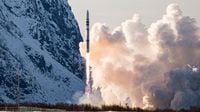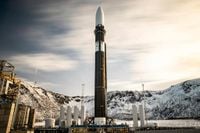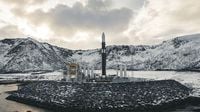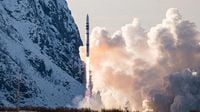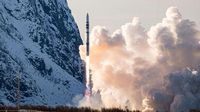On March 30, 2025, the first orbital rocket launched from continental Europe met an unfortunate end shortly after takeoff. The Spectrum rocket, developed by the German start-up Isar Aerospace, took off from the Norwegian spaceport in Andøya, located in the Arctic. However, just a few seconds into its flight, the two-stage rocket began to oscillate, turned around, and crashed back to earth, creating a loud explosion that was captured in live-streamed footage on YouTube.
Despite the crash, Isar Aerospace expressed satisfaction with the test flight, stating that it provided valuable data and experience for future missions. "This test flight allowed us to collect valuable data and gain experience for future missions. Thanks to Isar Aerospace's strict safety procedures and the Andøya spaceport, all personnel remained safe at all times," the company announced on X.
The Spectrum rocket measures 28 meters in height and 2 meters in diameter, with a carrying capacity of 1 ton. For its inaugural flight, it was launched empty. Daniel Metzler, co-founder and CEO of Isar Aerospace, had previously indicated that they had little hope of reaching Earth's orbit on their first attempt. "Our first test flight met all our expectations and was a great success. We had a clean takeoff, 30 seconds of flight, and we even validated our flight termination system," he stated.
Before the launch, which had been delayed several times due to weather conditions, Metzler emphasized the importance of every second of flight, saying, "Each second of flight is precious, as it allows us to collect data and gain experience. Thirty seconds of flight would already be a real success." The rocket's brief flight generated tons of data that the teams can now analyze for insights.
While the launch did not achieve its primary goal of reaching orbit, it marked a significant milestone in European space endeavors. The attempt was described as "historic" by Josef Aschbacher, the director general of the European Space Agency (ESA), who praised the first commercial orbital launch from continental Europe. He noted that once fully operational, Spectrum would provide increased autonomy for Europe in access to space.
The launch from Andøya is strategically important for Europe, as it allows for the targeting of orbits that are not typically accessible from other European launch sites, which are often located near the equator. This capability could enable the establishment of satellite constellations using smaller launchers, which Isar Aerospace aims to capitalize on.
In the context of the increasing miniaturization of satellites, the Spectrum rocket represents a new opportunity for European countries to develop their own launch capabilities without relying on larger, more powerful rockets. Benjamin Peter, a space news expert at Cité de l’espace in Toulouse, explained that the Andøya spaceport is well-suited for launching satellites into polar or heliosynchronous orbits, which are crucial for certain types of observations.
Isar Aerospace's development of the Spectrum rocket is part of a broader trend in the European space industry, which is seeking to establish a foothold in the small satellite launch market. The company has raised 400 million euros since its inception in 2018, making it one of the best-funded start-ups in the European New Space sector. Investors include Airbus Ventures and Porsche SE, among others.
Despite the setback, Isar Aerospace is already looking ahead. Two more Spectrum rockets are currently in production, and the company is preparing for future test flights. Metzler noted, "Nobody has succeeded in an orbital flight on the first attempt. SpaceX attempted four times before successfully launching Falcon 1." This sentiment reflects the understanding that early attempts in rocket development often come with high failure rates.
The first attempt at an orbital flight from Europe occurred in early 2023 when Virgin Orbit, owned by billionaire Richard Branson, attempted to launch a rocket from a Boeing 747. That effort ended in failure, leading to the company's closure. In contrast, Isar Aerospace's approach emphasizes real-world testing and rapid prototyping, drawing inspiration from the success of companies like SpaceX.
As Isar Aerospace continues to pursue its ambitions, the European space landscape is evolving. The company aims to develop more capable and reusable rockets based on the Spectrum design, positioning itself as a competitive alternative to established players like Ariane 6. With its focus on small satellite launches and innovative solutions, Isar Aerospace is poised to contribute significantly to Europe's space ambitions.
The future of the European space industry appears bright, with Isar Aerospace leading the charge in developing new launch capabilities. As the company prepares for its next flights, the lessons learned from this initial test will undoubtedly shape its trajectory moving forward.

